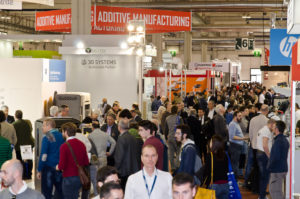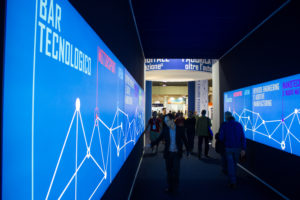 The 16th edition of MECSPE, organized and held at Fiere di Parma from 23rd to 25th march, hit the prefixed target: confirming its role as reference event for the manufacturing industry and the Digital Factory 4.0.
The 16th edition of MECSPE, organized and held at Fiere di Parma from 23rd to 25th march, hit the prefixed target: confirming its role as reference event for the manufacturing industry and the Digital Factory 4.0.
Numbers state it: the public attendance amounted to 45,817 visitors, with 2,051 companies on show on 105,000 square metres of exhibition surface. For three editions now, MECSPE has become the exhibition that anticipates the technological trends, as witnessed by the interest aroused by the core of the three-day event: the “Digital Factory 4.0” area in Hall 4 where, through a concrete and pragmatic approach, it was possible to see from close up the state of the art of the new “manufacturing made in Italy”, admiring how the integration of enabling technologies outlines a more and more efficient and interconnected manufacturing industry. The field shows signs of optimism: as confirmed by the numbers by the MECSPE Observatory (see thorough analysis on page 4), released at the trade fair, on a significant sample of Italian mechanical and subcontracting companies. The positive trend is also dictated by the Government’s support incentives through Calenda Plan, which provides for a rise of the amortization rate from the current 140% to 250% for investments in solutions for Industry 4.0. «We are living a business trend in which companies see the light at the end of the tunnel – stated Emilio Bianchi, General Manager of Senaf – After a negative period, they achieved positive results already in 2016. 50% of interviewees declare in fact in 2017 they will achieve a turnover rise exceeding 10%: backed by this recovered economic boost, entrepreneurs will keep on investing in research and development, increasingly oriented towards the model of Digital Factory 4.0 and focusing on people as central factor».
More and more 4.0 small and medium enterprises
 Positive trend for engineering and subcontracting SME: in 2016, turnover growth and rising employment rates. Besides, entrepreneurs, waiting for the application of Calenda Plan, start devising strategies and planning the increase of investments in enabling technologies. A lively sector, which has overcome the negative business trend and looks confidently at the development prospects offered by the fourth industrial revolution: this is the picture of the Italian mechanical and subcontracting companies taken by MECSPE Observatory. According to MECSPE Observatory, in fact, for the SME of the mechanical and subcontracting industry, 2016 ended with growing turnovers for almost half of them (48.7%) and a positive employment situation: if for 44% the number of employees did not change, as many as 46.8% engaged new personnel. Positive also the results expected for 2017: 56.6% foresee a rise of their turnover and a stable employment situation (49.8%) or even growing (46.2%). A situation that entrepreneurs deem satisfactory, as highlights also the Director of Senaf Emilio Bianchi, and with just 5% unsatisfied realities and a good six out of ten (59.9%) widely appeased by their company’s current trend. «For over half of entrepreneurs, the market has recovered its soundness and will go on offering new business opportunities – affirms Bianchi – Enterprises are called to review their productive paradigm, against a transformation that is concerning the sector and is oriented to the digitalization and the integration of more and more advanced technologies into production processes, to make them lean, efficient and highly performing. Supported by a recovered economic boost, entrepreneurs are not afraid of this evolution: they keep on investing in R&D and a growing number of them is oriented to the model of the Digital Factory 4.0».
Positive trend for engineering and subcontracting SME: in 2016, turnover growth and rising employment rates. Besides, entrepreneurs, waiting for the application of Calenda Plan, start devising strategies and planning the increase of investments in enabling technologies. A lively sector, which has overcome the negative business trend and looks confidently at the development prospects offered by the fourth industrial revolution: this is the picture of the Italian mechanical and subcontracting companies taken by MECSPE Observatory. According to MECSPE Observatory, in fact, for the SME of the mechanical and subcontracting industry, 2016 ended with growing turnovers for almost half of them (48.7%) and a positive employment situation: if for 44% the number of employees did not change, as many as 46.8% engaged new personnel. Positive also the results expected for 2017: 56.6% foresee a rise of their turnover and a stable employment situation (49.8%) or even growing (46.2%). A situation that entrepreneurs deem satisfactory, as highlights also the Director of Senaf Emilio Bianchi, and with just 5% unsatisfied realities and a good six out of ten (59.9%) widely appeased by their company’s current trend. «For over half of entrepreneurs, the market has recovered its soundness and will go on offering new business opportunities – affirms Bianchi – Enterprises are called to review their productive paradigm, against a transformation that is concerning the sector and is oriented to the digitalization and the integration of more and more advanced technologies into production processes, to make them lean, efficient and highly performing. Supported by a recovered economic boost, entrepreneurs are not afraid of this evolution: they keep on investing in R&D and a growing number of them is oriented to the model of the Digital Factory 4.0».
IoT and informatics security: the priorities of 2017
Mechanical and subcontracting companies, which have currently introduced new enabling technologies, have privileged informatics security solutions (30.6%), robotics (20.7%), mechatronics (20.1%), cloud computing (16.5%) and simulation (16.2%), which will benefit from further investments during 2017. At the end of the year, therefore, the informatics security will characterize one third of the companies (35.7%), more than one fourth will be equipped with robotics (25.8%) and mechatronics (26.4%), whereas over one fifth will adopt cloud computing (23.7%) and simulation solutions (21.3%). During 2017, however, the Internet of Things will enjoy the hugest investments, succeeding in scoring +12% and in being then present in almost one fourth of Italian enterprises (24.9%). The integration of these 4.0 enabling technologies into manufacturing processes will bring advantages especially to the optimization of the process quality control (78.8%) and of the real  time one of the supply chain (50%). They are followed by the remote monitoring (38.6%), the improvement of energy consumptions (34.8%) and a possible predictive maintenance (33.2%). Some hindrances, however, affect the transformation process of enterprises into smart, digital and connected factories, such as the uncertain investments-benefits ratio (44.9%), their cost (34.6%) and the need of engaging trained personnel (33.5%). Other flaw is the backwardness of the companies with which one collaborates (26.5%). «Waiting for new professional and university courses for the workers of the future, and for the Competence Centers and Innovation Hubs provided for by Calenda Plan for the alphabetization of businesses, today we need initiatives favouring the meeting among companies to dialogue, to exchange information and experiences and to assess concretely the competitive advantages of this fourth revolution – specifies Emilio Bianchi – Big companies, in fact, believe they can be a model for small ones: a domino effect process we must absolutely facilitate and support. With the project MECSPE Laboratories – Digital Factory started this year in Vicenza and Bari, which we are going to continue next months, and this new edition of MECSPE, where enabling technologies will be the protagonists, we want to help the manufacturing industry to find the Italian way to industry 4.0».
time one of the supply chain (50%). They are followed by the remote monitoring (38.6%), the improvement of energy consumptions (34.8%) and a possible predictive maintenance (33.2%). Some hindrances, however, affect the transformation process of enterprises into smart, digital and connected factories, such as the uncertain investments-benefits ratio (44.9%), their cost (34.6%) and the need of engaging trained personnel (33.5%). Other flaw is the backwardness of the companies with which one collaborates (26.5%). «Waiting for new professional and university courses for the workers of the future, and for the Competence Centers and Innovation Hubs provided for by Calenda Plan for the alphabetization of businesses, today we need initiatives favouring the meeting among companies to dialogue, to exchange information and experiences and to assess concretely the competitive advantages of this fourth revolution – specifies Emilio Bianchi – Big companies, in fact, believe they can be a model for small ones: a domino effect process we must absolutely facilitate and support. With the project MECSPE Laboratories – Digital Factory started this year in Vicenza and Bari, which we are going to continue next months, and this new edition of MECSPE, where enabling technologies will be the protagonists, we want to help the manufacturing industry to find the Italian way to industry 4.0».
Planning at best thanks to amortizations
Thanks to Calenda Plan and to the Government’s support, the prospects of an Italian manufacturing 4.0 are neatly improving among entrepreneurs, even if it is a still distant finishing line for 55.1%. Meanwhile, however, half of enterprises state they rely on a clear strategy and global vision of their future as Smart factories and of how integrating 4.0 technologies into their processes to optimize the production. For almost half of them (49.7%) the general digitalization reached in the company is good, especially referring to the relationship with customers and sale channels (57.1%) and to product design and development (54.9%). To reach these results, SME have invested a variable percentage of their revenues. Presently, while over half (50.5%) have allocated less than 10%, anyway 36.6% have exceeded this percentage and will do better in incoming years. Almost half of Italian companies (49.2%) plan to invest over 10% of their revenues in 4.0 technologies: almost four out of ten (38.7%) will invest 11-25% of their revenues and 10.5% of them more than 26%. A budget increase explained also in the light of the maxi amortization plan provided for by the Government for the introduction of 4.0 machines and solutions, which will be widely exploited by Italian companies (as stated by 47.9%): if over one fifth of Italian companies will turn to it for the first time (21.2%), 26.3% will demand it after already benefitting from 140% one. A number that will grow after the directorial circular letter dated February 15th 2017 concerning what goods are included among 4.0 investments, which will help 25.8% of doubtful enterprises to understand whether they will be actually entitled to benefit from it.
Economic trend of the 4.0 mechanical and subcontracting sectors
 The current business trend is globally satisfactory for the companies of the mechanical and subcontracting fields and can be explained by analysing, first of all, the general trend in 2016 and the forecasts for the year in course. In 2016, the order portfolio was judged “adequate” for their financial sustainability levels by 69.8% of enterprises, against 30.2% deeming it insufficient. Positive signs concerning liquid assets, considered good by half of entrepreneurs (50.8%), sufficient for almost four entrepreneurs out of ten (38.8%), negative for 10.4%. The export remains the driving engine for Italian SME, with almost 8 out of 10 (7.7%) stating they export their products and services, with a variable incidence. 32.7% declare they achieve abroad less than 10% of their turnover, 15.3% “from 11% to 25%”, 11.6% “from 26% to 45%”, 10.2% “from 46% to 70%” and 6.9% “over 70%”. Exporters mainly addresses the States of Central-West Europe (81.3%), followed by East Europe (30.5%) and North America (26.2%). About 22.5% export to Asia, 16% to Middle East, 15% to South America, 10.7% to Russia, 7.5% to North Africa, 5.9% to Oceania and 2.7% to Southern Africa. There are no doubts about the future of the market where single companies operate: in the next 3 years, only 8.5% expect a shrinkage of the market against 53% strongly believing in its development and 38.5% thinking that will be no big variations as to the current trend. In this economic horizon, SME still believe in the importance of research and development (92.4%), investing different percentages of their turnovers. 49.6% allocate less than 10% but as many as 25.2% invest from 11% to 20%, whereas 10.8% surpass this threshold.
The current business trend is globally satisfactory for the companies of the mechanical and subcontracting fields and can be explained by analysing, first of all, the general trend in 2016 and the forecasts for the year in course. In 2016, the order portfolio was judged “adequate” for their financial sustainability levels by 69.8% of enterprises, against 30.2% deeming it insufficient. Positive signs concerning liquid assets, considered good by half of entrepreneurs (50.8%), sufficient for almost four entrepreneurs out of ten (38.8%), negative for 10.4%. The export remains the driving engine for Italian SME, with almost 8 out of 10 (7.7%) stating they export their products and services, with a variable incidence. 32.7% declare they achieve abroad less than 10% of their turnover, 15.3% “from 11% to 25%”, 11.6% “from 26% to 45%”, 10.2% “from 46% to 70%” and 6.9% “over 70%”. Exporters mainly addresses the States of Central-West Europe (81.3%), followed by East Europe (30.5%) and North America (26.2%). About 22.5% export to Asia, 16% to Middle East, 15% to South America, 10.7% to Russia, 7.5% to North Africa, 5.9% to Oceania and 2.7% to Southern Africa. There are no doubts about the future of the market where single companies operate: in the next 3 years, only 8.5% expect a shrinkage of the market against 53% strongly believing in its development and 38.5% thinking that will be no big variations as to the current trend. In this economic horizon, SME still believe in the importance of research and development (92.4%), investing different percentages of their turnovers. 49.6% allocate less than 10% but as many as 25.2% invest from 11% to 20%, whereas 10.8% surpass this threshold.
The numbers of MECSPE 2017
- 45,817 visitors
- 2,051 exhibitors
- 105,000 square metres of exhibition surface
- 75 educational events, 10 Excellence Squares
- 58 Demo Units
- 11 Halls
The reasons for a record edition
- High-level professional visitors
- Contracts signed at the exhibition
- Sector transversal scope that increases exhibitors’ visibility
- Showcase of the Italian quality that intends to conquer foreign markets
- Central and strategic geographical position
NEXT EDITION
22nd -24th March 2018 at Fiere di Parma


